Why are top load washers so popular?
Top load washers typically waste water (yes, some models are HE, but *every* front load washer is HE...), the way they wash things wears out clothes faster, the central agitator takes up a ton of space and makes it hard to wash large items, you can't stack a dryer on top of one, and you have to bend over and reach deep into the washer to retrieve your clothes - don't you just love it when that last sock is right at the back of the washer, right where the central agitator is blocking you from reaching it?
Anyways, I don't understand why anyone who doesn't have knee problems would pick a top load washer over a front load one.
This post was edited by Raident on Sun, Nov 30, 14 at 4:02
Comments (49)
Related Professionals
Fox Lake Kitchen & Bathroom Designers · Calverton Kitchen & Bathroom Remodelers · Durham Kitchen & Bathroom Remodelers · Sunset Cabinets & Cabinetry · Kaneohe Custom Closet Designers · Berkley Custom Closet Designers · Bloomfield Custom Closet Designers · Fort Worth Custom Closet Designers · North Dakota Custom Closet Designers · Oshkosh Custom Closet Designers · Berkeley Heights Custom Closet Designers · Bella Vista Flooring Contractors · Lakewood Flooring Contractors · Montgomery County Flooring Contractors · Uxbridge Flooring Contractorsrecordaras
9 years agolast modified: 9 years agoI think it has to do with what people are used to. Why switch to an unfamiliar technology if you are satisfied with the results you've been getting from your top loader?.. People in North America have been using them for decades, generations even, and are obviously used to the issues that you point out.
It goes both ways - as a European transplant I would never consider a top loader, since I have only ever used front loaders and don't see any reason to make the switch.
Both options have their pros and cons, neither is perfect. To each their own.
GreenDesigns
9 years agolast modified: 9 years agoUnwillingness to change coupled with front loader prejudice.
hvtech42
9 years agolast modified: 9 years ago>really don't like the front loaders and believe they're made very cheaply
Whether it's made cheaply has nothing to do with whether it's top or front load. There are quality and crap machines in both categories. Unfortunately, the majority of top loaders being produced today are absolute junk and nothing like the ones being made even as recent as 10 years ago. Speed Queen is the only one I'd buy.
The main reason top loaders are still popular in North America is 2 reasons: price, and people who cannot be bothered to spend a few minutes learning how to use a front loader properly.
This post was edited by hvtech42 on Sun, Nov 30, 14 at 11:07
User
9 years agolast modified: 9 years agoI've had both in my day, and IMHO basically it comes down to these pluses for each:
Top Loader (without agitator)
* Ability to soak
* Less prone to mold-mildew issues
* Easier on bad knees (but can be worse for bad back, and cannot be ADA compliant)
Years ago my old GE had a removeable "mini tub" and special water setting for that kind of load. The mini tub fit onto the agitator and was great when I needed to wash just a very few things.Front loader:
* Can be ADA compliant, and also easier on a bad lower back IF paired with a pedestal. Without a pedestal, a front loader is miserable (as I have recently found out, because in this house I am forced to stack)
* Easier to add and remove items, especially if the user is vertically challenged. ;-)
* Supposedly easier on clothing but honestly when compared to an agitator-less toploader I can't imagine much if any difference in that respect.In my next house I will probably choose a front loader on a pedestal again (I will never EVER again stack my W/D!!), simply because my back is no longer tolerant of reaching in/pulling up movements. When I was younger it was no problem.
tibbrix
9 years agolast modified: 9 years agohvtech, I don't agree entirely. I DO agree that just about everything is made to break down now, whether it's a front load or a top load washing machine, or dryer, or whatever. No doubt that stuff was made much better years ago.
But what I meant by front loaders are made cheaply is that, the appeal of front loaders, when they first came out, was that they mimicked commercial machines, like in laundromats (similar to the craze of getting gourmet ranges for homes). Manufacturers made a product that LOOKS like a commercial machine, so tricks the consumer, charges a fortune, but what they're really getting is junk inside, and paying a lot for it.
Top loaders don't have that issue.
I've got a 15 - 20 year old Whirlpool top loader that a client of mine gave me when she moved. It runs like the day I'm sure SHE got it, and I'm dreading it breaking down, but if it does, I too will probably go with Speed Queen. The simpler the machine, the better it is. Fewer bells and whistles mean less to break.
finally, if you read the laundry forum here, you'll see more people coming in and starting threads about busted front loaders they've had for only a few years. I'm sure many disagree with me, but I'm pretty cynical and I think the front loader and gourmet range thing is corporate America pulling a fast one on consumers.
hvtech42
9 years agolast modified: 9 years agoI also see posts, not just here but elsewhere, about busted top loaders people have had for only a few years. Also some of the premature front loader failures are due to improper use. Detergent/fabric softener/soil buildups can eventually cause mechanical problems as well as nasty smells.
The Whirlpool Direct Drive you have is a nearly bulletproof design, so simple, so easy to fix. Definitely hold onto it as long as you can. If it breaks, repair don't replace, Whirlpool made about 30,000 of these washers per day for 30 years so there are a lot of them out there, and parts are super easy to find. Unfortunately even Speed Queen TL's are not as good in my opinion. Better exterior build quality maybe but they are so much more expensive and difficult to fix.
What you say re: home front loaders not being commercial quality is true unless you buy a Speed Queen front loader, which is pretty much the same machine inside as the small laundromat ones.
This post was edited by hvtech42 on Sun, Nov 30, 14 at 11:48
emma
9 years agolast modified: 9 years agoI don't understand why people buy front loaders or put in wood floors. They made front loaders years and years ago, and I would guess women didn't like them as well as top loaders. You bend more with front loaders than top. It's like putting down hard surface floors when years ago women covered up their real hardwood floors with carpeting. I am not an old fashion woman even though I am very old. I still like my top loader and my carpets.
This post was edited by EmmaR on Sun, Nov 30, 14 at 23:47
lazy_gardens
9 years agolast modified: 9 years agoI like the ability to soak clothing, and add a forgotten sock.
I hate having to crawl into a washer to get the clothing out.I don't think they "waste" water, as long as you wash reasonable sized loads.
hvtech42
9 years agolast modified: 9 years agoDryers have always been front load except for F&P, nobody seem to complain about bending for them. And on top loaders you have to bend to get stuff from the bottom. I would think a front loader on a pedestal would be far better than a top loader in terms of bending.
Acadiafun
9 years agolast modified: 9 years agoI have a top loader HE without the agitator and there are some things that the traditional top loader (with agitator) does better. For example, you can soak clothes as long as you like. You can wash water resistant fabrics and tennis shoes in them which is a no-no for the HE ones. You can interrupt the load at any time to throw in a dirty item or even a clean one that is just wrinkled without having to start the cycle over or worry about the load becoming unbalanced.
I find a HE top loader easier to get clothes out of and less bending then a front loader. Plus no moldy smell. It is easy to keep the top open to air out between washes. I also don't have to worry about a leaking door seal.
herring_maven
9 years agolast modified: 9 years agoTibbrix: "[T]he appeal of front loaders, when they first came out, was that they mimicked commercial machines, like in laundromats (similar to the craze of getting gourmet ranges for homes)."
Erm, no. When consumer automatic washing machines were introduced -- in the United States, that was in the 1930s -- they all were front loaders. There was nothing else to contrast to them. At the time, tub-type non-automatic washing machines did exist; they had a wringer -- called a mangle, actually -- usually mounted on an arm above the tub, so that laundry could be manually lifted out of he washer tub and "run through the wringer" (that is whre the phrase originated) before hanging it on a line with clothes pins to dry.
At the close of World War II, all of the companies that had been producing tanks and fighter planes and guns had physical plant capacity and a trained work force that was no longer needed as much to produce war materiel, and some of them decided to produce wringer-less tub washing machines. And so the top-loading washing machine was born, many years after the front-loading washing machines had created the market for automatic washing machines. The new automobiles after World War II (the link below is an example) liked to mimic the look of airplanes, and the top-loading washing machines -- the tubs had lids! -- looking completely unlike the established front-loading washing machines, were the new look and ever so shi shi.
Here is a link that might be useful:

practigal
9 years agolast modified: 9 years agoWow! Herring, thanks for the education. That certainly explains why they WERE popular, I'm not clear on why they are still popular except that when front loaders were (re)introduced into the market during the last 20 years they were not initially very well thought out, coupled with the inability for the end-user to make easy repairs and the mold problem,...well, it is amazing to me anybody is using a front loader. The government's fantasy is that in forcing all of us to "go green" we are taking less of a toll on the carbon footprint. But the truth is that one easily repaired machine that could last 50 years or more would be a far better investment for all of our futures.
hvtech42
9 years agolast modified: 9 years ago^Front loaders were not discontinued and re-introduced, they have offered pretty much continuously since their introduction in the 30s through today.
Actually, I take that back about them being offered continuously: the main front load manufacturer throughout the 60s, 70s, and 80s was Westinghouse, part of WCI (White Consolidated Industries), a big appliance conglomerate which eventually bought up tons of manufacturers: D&M, Frigidaire, Gibson, Tappan, and more. Those front loaders were also sold under the Frigidaire name. However they really weren't too popular in the US since they did not have the vibration control today's front loaders do. Also, the difference in water usage compared to agitator top loaders was not always so dramatic as it is now. In the late 80s (IIRC) the line was discontinued. They were solid, well built machines with no electronics that ran and ran, but the sales just weren't there. Shortly after, Electrolux bought WCI. In the late 90s, they decided to try marketing a brand new front loader to the US again. This was one was also simple, but a bit more refined, with better vibration control and far superior efficiency to the old ones.
This was the machine that kicked off the popularity of front loaders in the US. I was an early adopter, buying one in 1997, having used top loaders all my life. I moved from that house, so I'm not sure what the status of that machine is today, but I bet you any money it is still running, those things were RELIABLE. I've stuck with front loaders since with much success.
I keep seeing generalizations like front loaders are poor quality, front loaders are hard to work on. I call BS. It is possible to build a good front loader, it is possible to build a crap front loader. Both have been done. Same goes for top loaders. If you want a high quality front loader, you can have one. It's called Speed Queen. Yes it's expensive. You get what you pay for. It is MUCH easier to work on than most front loaders AND most top loaders sold today. Same goes for top loaders. If you want to save money with a different brand, go ahead, but don't expect it to last as long. The money you saved reflects cut costs in the design, engineering, and manufacturing of the machine.
As for mold, that's been addressed on this forum many times. User error. There are many things that can and should be done to prevent this. It is clearly not a design flaw, since there are many cases where one household will be mold free, another will be disgusting and with the exact same model front loader! Having said that I think manufacturers could incorporate more features and better documentation with their products to help reduce mold. Europe has used front loaders forever, they don't have a mold problem. It's because they know how to use them. Conversely, they have no clue how to use agitator top loaders. Back when I still used an agitator top loader, I had family from Europe visit who had used only front loaders their whole lives. They tried to do their own laundry in my washer one day. it was a disaster. The clothes were poorly rinsed and some were damaged. I investigated further. They had overloaded the machine horribly and poured the detergent into the fabric softener cup in the agitator. Yet they claimed that top loaders "don't clean anything and they rip up your clothes". You and I both know that's not true.
I personally prefer front loaders but my attitude is that people should buy whatever machine they like best. If that's a traditional agitator top loader, fine. There have been many times on this forum where I have steered people towards the Speed Queen top loader, because I know it's what they will like best. However when I see complete misinformation and lies posted about front loaders (which happens quite a lot here) I have to call people on it.
knot2fast
9 years agolast modified: 9 years agoI suspect many people purchase top loaders for price, convenience (comparatively short cycle times), and familiarity.
Another reason may be deep fill rinse performance for people with sensitive skin or noses.
For most of us growing up in the US, the washer our parents used tended to last 20+ years. With the possible exception of Speed Queen, that may be a fading memory for top loaders, but this forum is filled with 10 year old front loaders with XYZ error code that aren't cost effective to fix.
Water as a natural resource is rather plentiful in some areas and rather scarce in others. It isn't economically feasible to transport it long distances, so conservation is always good, but much more critical in some areas. I imagine nobody who buys a HE machine primarily for water saving waters their lawn. Certainly not with an in-ground built-in sprinkler system run from a timer in their garage.
Front loaders that aren't on pedestals are maddeningly low for those of us taller people. I have to practically turn myself upside down stooping over to look for a missing sock. That's a wash (pun intended).
Either system will clean clothes. Each have their merits. I can see why lots of people are happy with their front loaders, but the people who choose top loaders aren't necessarily crazy.
practigal
9 years agolast modified: 9 years agoThere are many front loader washers out there that I would consider well-built but for the lack of a lint filter. To my knowledge not one front loader on the market today has one. Are you aware of any? If you do, please let me know which machine. I read a lot of complaints by pet owners about the lack of a lint filter. Are pet owners supposed to have pet bedding that is either never washed or is thrown out after one use? Even though I vigorously vacuum the pet bedding before washing, a lot of fur ends up in the old Maytag aqua filter which I check after every load. Most of the time the filter is empty but when it is full it would be a pipe clogger but for the filter. I would PREFER a frontloader, but given the lack of a lint filter and the fact that many of the newer machines have only a pump filter in a location that is not serviceable by the consumer (except with great effort), I feel like the industry is not making a reasonable product. They are presuming that we are "set and forget" idiots. I see that there is an aftermarket sock type thing that the user can attach to an outgoing hose but it's completely inconvenient in that it presumes that the machine is draining into a sink or that the drain hose is otherwise conveniently located which it is not the case when the w/d is stacked in a closet...
When this machine goes, will I buy another toploader? I am certainly not intending to, front loaders seem to have more everything then today's toploaders...although I may not have to worry about this as my current toploader has already outlived its first owner by 20 years and may outlive me too.lee676
9 years agolast modified: 9 years agoI briefly had one of the aforementioned Westinghouse/WCI front loaders, the ones with the slightly oval window and a drop-down door. The same basic design, which I think dates back to the 1960s, was built right up to the mid-'90s when it was replaced by the new Frigidaire/Kenmore 3.1cu.ft. unit (which I also used to own), and these seemed to have sparked the front-load revival in the US.
My Westinghouse FL was from the early '70s before the WCI buyout. It was a very basic machine. Only tumbled in one direction, didn't heat its own water, lacked a detergent or fabric-softener dispenser, and you had to set the water level yourself. High-end models had a scale built into the drop-down door - you put your dirty laundry on it and the pointer on the scale would tell you where to set the water level based on weight. The capacity wasn't much better than in a modern 24"w European-size machine, although it was 27" wide. The spin speed was about the same as top-loaders of the day, which is to say slow, maybe 650rpm. Despite all of that, the things were quite serviceable, and washed clothes effectively and using much less water than top-load washers
I didn't know FL washers (or any fully automated machines) were made as early as the '30s. The oldest ones I've seen were Philco machines from the late '50s. These were huge and IIRC had to be bolted to the floor like a big commercial washer! I can't imagine how much these must have cost to install. Many of the postwar Levitt houses had these installed when they were built, and at least one of them was still there as of 10 years ago. It wasn't working - there was another modern washer and dryer next to it - but the thing was too big and heavy to easily lift out of the basement so it stayed. Amazingly, the same machine also dried the clothes. Combo washer/dryers are also nothing new - several American manufacturers made them back then, and several were much wider than standard washers or dryers so the capacity would be fairly large. I don't get why they didn't sell better than they did.
Were any of the old wringer washers front-load? I've never seen one that wasn't top load.
Raident
Original Author9 years agolast modified: 9 years agoThank you for the thoughts, everyone. I must say, I'm rather biased against top loaders due to bad experiences:
About 2 years, I moved from an apartment with a builder-grade front loader, which was about 10 years old by the time I moved out, to an apartment with a builder-grade top loader, which was maybe 1 year old when I moved in - the building was practically brand new at the time. This particular top loader washing machine model has caused, to the best of my knowledge, 4 separate floods each resulting in over $50,000 in damage to the building - each flood was massive enough to seep down several floors, requiring the affected units to be stripped down to the supporting pillars and rebuilt from scratch, just to give you an idea of how bad the flooding is.
And despite numerous lawsuits and even Whirlpool themselves publicly admitting to and apologizing for the problem, they still refuse to recall the machines, claiming that a simple repair can solve the problem even though there are many reports of supposedly "fixed" washing machines causing floods (the most recent of the 4 floods in the building came from a washing machine that Whirlpool had officially documented as fixed).
I've never had any trouble with my previous front loader. And while I personally have not yet had trouble with this top loader (and have not been affected by any of the floods), it's basically a ticking time bomb. To make matters worse, even if I got rid of this washing machine it wouldn't make an iota of difference - after all, one of my neighbors living on a higher floor could easily flood me...
And just in case anybody thinks I'm making this up, here's a local news report on the issue: http://bc.ctvnews.ca/whirlpool-apologizes-for-washer-floods-will-pay-deductibles-1.1029347
Would anybody still like to make blanket statements about how top loaders are high quality and front loaders are poorly made?
This post was edited by Raident on Tue, Dec 2, 14 at 1:00
beaglenc
9 years agolast modified: 9 years agoI have had top loaders all my life until '08 when I got a Bosch Nexxt. I was so excited and felt good using much less water. Then reality set in. Long sleeves and pants always came out twisted badly. and yes I buttoned the shirts and folded them and the pants before they went into the washer. I had one pair that came out with a permanent crease. But real problem was the vibrations, yes the washer was level. The walls and floor would shake, dishes would rattle. I was really concerned about doing structural damage to my house. I was surprised that it didn't clean as well as my TL that it replaced.
So, after 5 years, I replaced it with a Speed Queen TL. Clothes come out clean, no more unbalanced loads, no shaking walls and floors. I might add that my house is sturdy, not shottily built.
armjim
9 years agolast modified: 9 years agoThe reasons I prefer a TL are that a FL does not use enough water to satisfy my preferences and the very long time it takes to complete a cycle on a normal soil setting. Those, and the overly sensitive balancing act my current FL goes through to spin a load.
A current TL does not thrill me either with the Energy Saver restriction on getting a tub of hot water from the tank of the water heater, but at least it is a full tub of water to both wash and then rinse the load, and that is what I prefer. My folks have a Maytag TL which is about 12 years old now and it is the perfect machine in terms of what I want a washer to do.
dave1812
9 years agolast modified: 9 years agoyour post is funny, beagle.
My FL (Samsung 520) washes clothes an order on magnitude better than any TL I've owned (including the older, venerable, well made Maytag before they ruined the brand).
TL's use a lot of water, by comparison. I envision my city going on water rationing in 2015...
armjim
9 years agolast modified: 9 years agoBeagle, I am in complete agreement with you. My experiences exactly. When I was researching Front load washers back in 2000 I was really looking forward to owning one. I too found that the two I have owned did not clean any better than the top load washers I had owned previously. Certainly not worse, but no better in my experience. I frequently came to these forums while doing research so I could make certain I was properly using detergent, loading and so forth. I learned a lot here and on the automaticwashers web site.
In my opinion, FL washers are best utilized by people who are really into washing machines. The average person considers them an appliance like a refrigerator or a toaster. They are not going to bother with reading the manual back and forth or going to the internet to research things. Therefore they have issues with oversudsing, mold and mildew and all the things people complain about. I clean my dispenser routinely and do not enjoy doing so, but I know it is essential. The average person probably has no idea they should be doing that or using the clean cycle or using a washer cleaner.
Jasdip
9 years agolast modified: 9 years agoI really don't see the appeal. My parents own an LG washer and dryer and it takes forever to do a load. They are retired, their clothes don't get dirty, and they don't have 17 pairs of jeans, etc to wash at a time, that the washers brag about.
The only time I use a front load is if I go to the laundromat to wash comforters,bedspreads etc etc. I honestly don't see how seeing clothes drop into a swish of water really gets them clean.
My beef is that I like to wash some loads on Hot, but it uses so little water that it isn't hot yet when it reaches the machine so my clothes are in cold water.
mrb627
9 years agolast modified: 9 years agopractigal
9 years agolast modified: 9 years agoReally "average" is as depicted in that that photo? Tough sell there....I don't think users on this forum are likely to be average. My machine is much older and it still looks almost new....not like a slob has been using it...
tibbrix
9 years agolast modified: 9 years agoI spend a lot more on electricity every year than water. A TL gets a load done in 45 minutes. FLs are such LONG cycles, hour and a half…electric meter is running the entire time. I'd rather use a little more water and a lot less electricity. As well, using water doesn't pollute the air while using electricity does.
tibbrix
9 years agolast modified: 9 years agoRaidan, the flooding problem has nothing to do with the machine being a top loader. It's a defect in the manufacturing of the product. Your argument is like saying that everyone should buy electric cars and no cars with combustion engines because the Edsel was a failure.
Also, your last question about making blanket statements about top loaders or front loaders is kind of ironic since you're argument is that front loaders are horrible because of one model's manufacturing defect, i.e.: you're making a blanket statement.
This post was edited by Tibbrix on Wed, Dec 3, 14 at 9:13
mrb627
9 years agolast modified: 9 years agoUsers that FREQUENT this forum are neither average or normal for that matter.
The "average" user who treats their washing machine as they would a refrigerator does not care for it the way you or I would.
MRB
armjim
9 years agolast modified: 9 years agoMRB, that was the point I was making. Those here who read and post are not the average user, but are certainly the minority in the real world. I guarantee you none of my family, friends or colleagues would spend more than a minute reading about washing machines, much less writing something about them. They all have one, and use it to do laundry and don't bother to become well educated about it because it is not their interest. That is not to say they are careless or uneducated, they are just not fascinated by their washing machine.
hvtech42
9 years agolast modified: 9 years ago>FLs are such LONG cycles, hour and a half…electric meter is running the entire time. I'd rather use a little more water and a lot less electricity
My front loader gets through a full normal load in about 50 minutes. And since their motors are far more efficient than traditional TLs so they use less electricity and water, your point is moot.
tibbrix
9 years agolast modified: 9 years agoActually, it's not moot, in the way you're wrongly using it. For one thing, "Moot" means "debatable", so in fact it IS moot. That's why law schools have "moot courts".
Second, I don't know why you're so defensive about FLs. If you prefer them, then use them. I prefer TLs. In fact, FL cycles are MUCH longer than are TLs. But as this article points out, where the electricity savings lie is in the drying in that FLs spin faster so the clothes take less time to dry but more time to wash because of the lack of water.
Now, I hang my clothes to dry on a line most of the year, obviously not in winter, so I save even more in electricity costs incurred by laundry, but of course a dryer generates more electricity use than does a washing machine.
However, FLs are much more expensive to purchase than are TLs, so while the energy use is a wash, i.e.: shorter wash times for TLs, shorter dry times for FLs, the upfront expense of the purchase is not offset. It's like when Priuses first came out. They were much more expensive than a comparable car with a combustion engine, but the difference in the price of the car would take about ten years to make up for the gas savings.
Here is a link that might be useful: Comparinmg TLs and FLs
This post was edited by Tibbrix on Wed, Dec 3, 14 at 10:07
writersblock (9b/10a)
9 years agolast modified: 9 years agoHmm, Tibbrix, all my dictionaries (except I haven't bothered to haul out my OED) also list a secondary meaning:
>having no practical significance because the subject is too uncertain to allow a decision: It is moot whether this phrase should be treated as metaphor or not.
Anyway, another reason for top loaders is all those of us who live in places that only allow a space for a top loader. For instance, around here practically every townhouse I've been in that was built prior to 2000 has the washer squeezed in beside the toilet in the downstairs bath with no way to open a door and have access from the front.
hvtech42
9 years agolast modified: 9 years agoI understand that many people prefer top loaders, and I have no problem with that. What I have a problem with is when people post incorrect information about front loaders. I believe that when people research the two types of washers they should not be deciding based on misinformation.
Bottom line, not all FL cycles take as long as you say, and front loaders have far more efficient motors that use much less electricity. Even if FL motors did use more power, the energy saved at the water heater would far outweigh the motor.
Correct or not, by moot I meant insignificant. Motor energy use is not a valid reason to pass up an FL. Cycle time is a valid reason to pass up an FL, but before doing so one should do more research and learn more about the full range of cycle times that various FL models actually take.
dadoes
9 years agolast modified: 9 years ago
I've seen toploaders in much worse condition than the one pictured above. Also, the munge showing on the agitator and around top of the basket is just a hint of what's under the agitator, on outside of the basket, and inside of the outer tub.Toploaders and frontloaders are equally susceptible to dirty washer syndrome. It has much less to do with the design and type of machine, and much more to do with (bad) user habits.
If and when I have need to buy a new washing machine, it will be a frontloader for sure.
tibbrix
9 years agolast modified: 9 years agoNo one said it is a valid or not valid reason for anything. It's a factor to consider among many when making a decision. And no one has posted false information. That is false.
hvtech42
9 years agolast modified: 9 years agoQuite frankly I don't see any reason this thread needs to continue. FL vs. TL debates have happened many times here and they never seem to end.
Here are the facts, and what everyone should agree on:
-Both front loaders and top loaders clean clothes
-Both front loaders and top loaders have the potential to last a long time
-Both front loaders and top loaders also have the potential to fail early on
-Both designs can be prone to problems or incorrect usage that result in poor cleaning or damage to clothes
-There are valid reasons that one might prefer one or the otherIf you disagree with any of the above, sorry but you're just plain wrong. Just because something was your experience doesn't make it universally true.
For future posters to this site, if you want advice on which to buy, you need to go into more detail than asking "which is better". What are your your usage habits, desired features, etc?
hvtech42
9 years agolast modified: 9 years ago>And no one has posted false information. That is false.
>I'd rather use a little more water and a lot less electricity
That is false information. Top loaders do not use "a lot less electricity.
>electric meter is running the entire time
Okay assuming you have no other loads at the time, the electric meter may run longer with an FL than a TL, but how fast is it spinning during that time compared between the two washers?
>As well, using water doesn't pollute the air while using electricity does
Okay, but what about the water heater? The primary motivation behind many people choosing front loaders is to cut down on HOT water usage.
>FLs are such LONG cycles, hour and a half
This is not necessarily false, as many front loaders do indeed have cycles that take that long. But it is misleading as it is not always true and is significantly above average for a standard cotton/normal cycle.
tibbrix
9 years agolast modified: 9 years agoSigh.
the only one you maybe have a case for is the first, and that is not true either because new tis are also energy savers along with the FLs.
SOME FLs have a "quick wash" option, but I seriously doubt the average homeowner uses it on a regular basis. INstead, they use the regular cycles, all of which are at least an hour or longer.
TLs also have options for shorter cycles, so that argument is a wash.
Short cycles on a FL will not get clothes as clean, again, because of the lack of water. The REASON FL cycles are longer is because they have to agitate more to clean better because of the lower amount of water.
the real energy hog re: laundry anyway is the dryer.
AT any rate, I use both styles on a regular basis, and I much prefer TLs for a whole host of reasons. Others prefer FLs. But no one has posted false info. Be careful when you accuse people of lying.
moviegeek
9 years agolast modified: 9 years agoI bought my top-loader w/agitator because it was cheap and highly rated. It has worked flawlessly for 8 years and never develops mold, I like that I can select water level and pre-soak. I am also fairly tall so it's easier for me to unload a top-loader.
As for mold, it can occur in any type of machine. You should leave the door/lid open between washes to let it dry out. Once a month you should clean the washer with the "sanitize"or "washer cleaning" cycle, you can use hot water and bleach in the old top-loaders. I also wipe the inside of my machine about once a month so it doesn't look like the photo above.
This post was edited by moviegeek on Wed, Dec 3, 14 at 12:12Oaktown
9 years agolast modified: 9 years agoI can see why someone might want a top loader, it is less expensive, and works fine for many folks.
The energy use question is interesting, I would guess the numbers for Energy Star models of either format would be readily available (as they are for refrigerators)?
Buy a front loading machine if you are short (or teaching your kids to do laundry) and have to use a stool and/or tongs to get wet clothes out of the bottom of a top loader. Buy a front loading machine if you are short on space and stacking.
hvtech42
9 years agolast modified: 9 years agoMy "Cotton/Normal" cycle takes 50 minutes with a mostly full drum. This is not a "quick cycle" and is a significant difference from the hour and a half you claimed. It does well on normally soiled loads. If I have a heavily soiled load, yes I would use a longer cycle with hotter water.
I admit that I may have gone overboard by saying "false info". But I see a lot of misleading info about them posted here. Stuff like: they break easily, they are poorly built, they don't clean, they grow mold. Those claims are not entirely unfounded. Front loaders are more likely to develop mold than traditional top loaders. But, with proper use/care it can be avoided. Some front loaders are poorly built, just as some top loaders are poorly built. Even well built ones of both types can break. Improper use can also lead to poor cleaning.
However, those claims are usually posted with the implication that they apply to ALL front loaders and therefore they should be avoided entirely. That is what annoys me, not people discussing the pros/cons of both washers.
knot2fast
9 years agolast modified: 9 years agoSo Raident wasn't here seeking information at all. Who knew the THS laundry forum had trolls?
The flooding Whirlpool top loaders Raident was clucking about had faulty water level pressure sensors allowing water to flow into (and out of) the machines for hours if nobody was home. That defect has nothing inherent to do with the machines being top loaders.
stir_fryi SE Mich
9 years agolast modified: 9 years agoFront loaders would not fit in my laundry room (too deep) and I would not be able to fully open my laundry room door.
Not all of us have huge laundry rooms.
beaglenc
9 years agolast modified: 9 years agoEEKK!! MRB, that is one nnaassttyy machine! Don't think I would even put in puppy training clean up towels in it with lots of hot water and LCB. Guess their are some that think that all it takes is a little soap and cold water and everything comes out squeaky clean and germ free. Can only imagine what the outer tub looks like. FWIW, I never had any mold with my FL, I always used hot or warm water and left the door ajar all the time. I really wanted to love it but couldn't deal with all the shaking and rattles and that was regardless of what cycle was used.
I really loved when I used the clean cycle. it would rev up and sound like a jet. Silly, I know.colle
4 years agolast modified: 4 years agobeaglenc, I’ve had a completely different experience with my Bosch Nexxt 500.
It cleans all my clothes well with minor tangling, and exceptionally well with whites on Temp Boost or XXSanitary.
I have not had issues with shaking during the spin cycles at all. I barely hear anything, as some on here have described it as the sound of jet engine.
My washer is also levelled and located in the basement on concrete floor so that maybe different than your situation.
Here’s why I will never go back to TL washer.
it’s been awhile since I’ve had to use a TL and my recent usage only emphasizes the difference from FL washers.
I used to have a mid-1980s heavy duty large capacity Kenmore TL washer, which is the same that my sister has.
I’ve been here for almost 2 months helping her while she’s undergoing cancer treatments, so lots of laundry is done.
I didn’t remember how little the TL actual capacity was, even though the dimensions of both type of machines are 27” wide, and listed as almost 3.8 cubic ft.
The Kenmore TL is probably rated at 10.0 lbs - adding more laundry and it’s incapable of thorough cleaning and rips them up.
It uses about 50 gallons of water per load (25 gal wash, 25 gal rinse) but if you’re like my sister and need to do a 2nd-rinse to ensure detergent residue is gone then it uses about 75 gallons per load of 10.0 lbs laundry, which really isn’t that much [about 8 large bath towels (30” x 60”), or 3 queen-size bed sheets (2 loose, 1 fitted) with 2 pillow cases.]
For bulky items, it’s even more restricted. I could only fit a light full-sized comforter.
I currently have a 2009 Bosch Nexxt 500 plus and its’ capacity is also 3.8 cu ft. It is rated at 8kg, so just under 18 lbs.
It uses 13.5 gallons (4.5 gal wash, 4.5 gal 1st rinse, 4.5 gal 2nd rinse) of water per 8 kg load (about 15 large bath towels, or 3 queen-sized bed sheet sets (3 loose, 3 fitted, 6 pillow cases). I’ll do a 3rd-rinse so that brings the water total to 18 gallons per load of 18 lbs of laundry.
WATER USED (for 18lbs of laundry):TL - 150 gallons = 75 gallons per load x 2
FL - 18 gallons
DETERGENT USED:TL - 250 ml for 18 lbs of laundry (125 mL per 10 lbs load)
FL - 22.5 ml per 18 lbs load
WASH TIME USED:TL - 220+ minutes to do same 18 lb load
(110+ minutes for each 9-10 lbs load full wash cycle and additional 2nd rinse that requires user to be there to reset machine for the added rinse x 2
FL - 110 minutes for full wash cycle and additional 3rd rinse that can be programmed at start of wash
DRYING TIME USED:TL - 2 hours as each 10 lb load typically takes 1 hour to dry because clothes are spun out at lower ~600 rpm resulting in more dampness
FL - 30 minutes for 18 lbs load as clothes are spun out at higher 1000+ rpm
In this instance, my FL washer will use 1/8 water; 1/11 detergent; 1/2 timeSteve S
4 years agolast modified: 4 years agoUnless you play rugby in the mud or have kids, you’re probably a working professional type in an air-conditioned environment and don’t sweat much.
Or you might be like my elderly mother, retired never gets dirty. She meets her friends for lunch maybe and maybe some shopping. And those clothes go into the hamper looking still pretty clean.
That is not even a challenge for either type of washing machine to clean. So logically, it makes sense from her POV that her old Top loader washer serves her needs just as well as my Miele ever could.
twebbz
4 years agolast modified: 4 years agoAnyone can run a standard agitator top loading washer but a front loader requires a learning curve...even between different models and manufacturers. Being able to soak in a top loader is a great feature too. I can't do a soak in my GE front loader.
colle
4 years agotwebbz, some FL have a soak function.
In my 9 yr old FL Bosch Nexxt 500, the soak option agitates the load for few minutes and then lets it soak for 15 minutes (or so), and repeats the cycle several time for 2 hours.

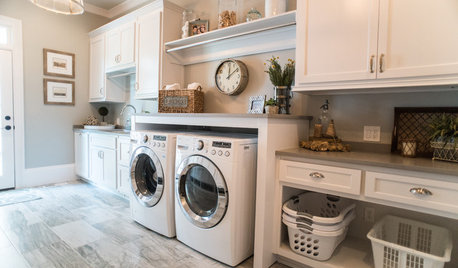
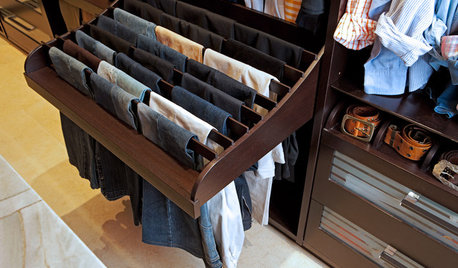
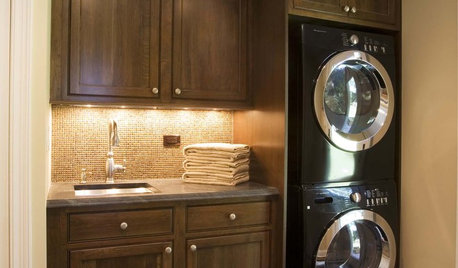



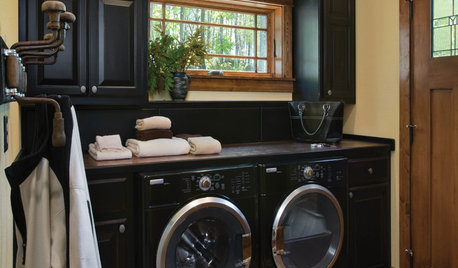








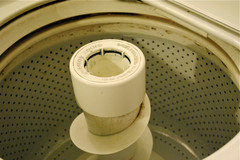


tibbrix